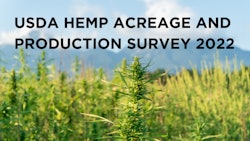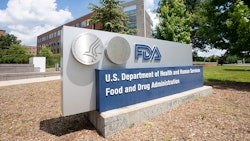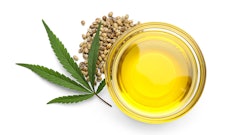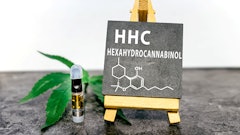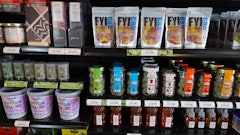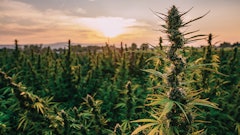
The U.S. Drug Enforcement Administration (DEA) may propose new rules that would drastically change the hemp-derived cannabinoid and CBD markets.
At the DEA's Supply Chain Conference in early May, Terrence Boos, chief of the DEA's Drug and Chemical Evaluation Section, revealed in his presentation that the agency plans to release new rules that would clarify that any cannabinoids created by chemical synthesis from hemp, such as delta-8 or delta-9 THC, are controlled substances under the Controlled Substance Act.
Shane Pennington, counsel at cannabis law firm Vincente Sederberg, attended the DEA's conference in early May. He says Boos' presentation comes on the heels of implications caused by the Agriculture Improvement Act of 2018 (the 2018 Farm Bill), which legalized hemp at the federal level.
"Obviously, after the 2018 Farm Bill, the implication is that we're seeing the unintended consequences of what is perceived to be the descheduling of these intoxicating hemp substances," Pennington says.
Since the passage of the 2018 Farm Bill, various "intoxicating" products including compounds, such as delta-8 or hemp-derived delta-9, have surfaced in the marketplace, resulting in lawmakers in several states implementing regulations that outlaw or regulate such products.
RELATED: UPDATE: What is Delta-8-THC?
While the DEA has previously stated that natural constituents of cannabis are uncontrolled, many of these products are being synthetically converted in a lab from CBD or delta-9 THC, leaving the legal status of these products unclear—some say it's federally legal under the 2018 Farm Bill, while others consider it a loophole.
Boos also noted in his presentation that the federal agency had received recommendations from the U.S. Department of Health and Human Services (HHS) saying that up to 0.1% THC is safe and that based on the HHS's guidance, the DEA plans to modify regulations to "decontrol CBD up to 0.1% THC on a weight-to-weight or weight-to-volume basis," Pennington says.
According to Pennington, Boos was referring to descheduling synthetically derived CBD, as naturally sourced CBD is legal under the 2018 Farm Bill if it’s sourced from a plant that doesn't contain more than 0.3% delta-9 THC.
"Although the scheduling recommendation isn't technically binding on DEA, DEA has never overridden an FDA (Food and Drug Administration, a sub-agency of HHS) scheduling recommendation in the history of the agency. … In practice, it is a very authoritative recommendation," Pennington says. "He's saying we got a heads up that this is coming, and once that gets there, it just begins a process."
Pennington says that once the HHS's recommendation arrives, DEA will review it and develop its analysis before publishing the proposed rule in the federal register. He says that this is a lengthy process.
"They'll attach FDA's analysis to the federal register posting, and then it starts several more steps of the process beginning with notice and comment. I think it's 60 days where anybody can weigh in on it, and interested parties can ask for hearings," he says. "If people ask for hearings, those hearings are held before an administrative law judge, and the trial is involved. You can object, have witnesses, and put on evidence. The point of what I'm saying is this is an incredibly involved ordeal. It takes an average beginning to end of 9.2 years to complete this process."
Despite the typically lengthy process, Pennington says it's anticipated for this process to move notably faster, especially after President Joe Biden's announcement in October 2022, where he said he would pardon thousands of people with previous federal cannabis possession charges, urge governors to do the same at the state level, and request that HHS Secretary Xavier Becerra and Attorney General Merrick Garland review cannabis's Schedule I status.
RELATED: Biden's Order to Review Cannabis 'Truly Historic,' But What's at Stake?
"We are in a unique time when it comes to cannabis-related issues because the president of the United States took the historic step in October of being like, 'I want to expeditiously reconsider marijuana's scheduling classification under federal law,' and so the thinking is, what does expeditiously mean when you're talking about something that takes about a decade usually to do? Who knows?" Pennington says.
While he doesn't have confirmation on this, Pennington says the idea is that they are moving quicker on cannabis scheduling in general.
"And it's no surprise that this other issue is coming up. In other words, because these intoxicating hemp products are part of the bigger cannabis umbrella they're focused on, even though there are different issues, they overlap a great deal," he says. "It makes sense that the agencies involved would be aware of what they're doing with marijuana when looking at the intoxicating side. ... All of this to say that it kind of makes sense why the timing would be what it is if they're trying to move fast."
If this recommendation takes effect and every state immediately enforces it, it could be "absolutely devastating" and would essentially ban nearly every delta-8 product on the market, he says.
RELATED: Industry Associations Weigh In on 2023 Farm Bill: What's to Come for Hemp?
And as the upcoming renewal of the Farm Bill approaches, there is also a potential for Congress to enact comprehensive regulations regarding all intoxicating cannabinoids.
Join us this year at the Paris Las Vegas Hotel & Casino for Cannabis Conference, the leading education and expo event for plant-touching businesses.










